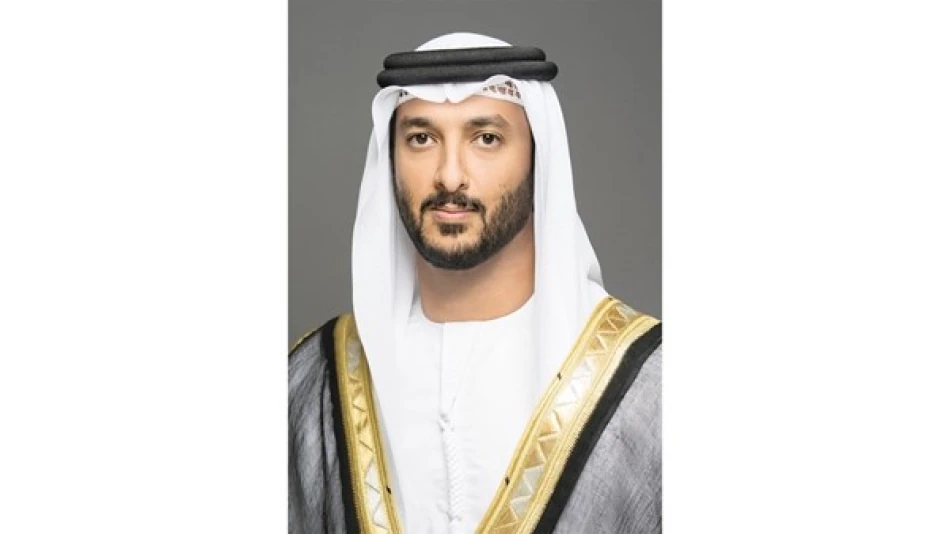
Emirati-Tunisian Cooperation Holds Vast Potential, Says UAE Minister
UAE and Tunisia Target Strategic Food Security Partnership as Gulf State's Agri-Food Sector Surges
The UAE is positioning itself as a regional leader in food security innovation, with its agriculture and food sector now contributing 11% to non-oil GDP as of 2024. At a bilateral forum in Tunisia, UAE officials outlined ambitious plans to deepen cooperation with North African partners, signaling a broader strategy to diversify supply chains and reduce food import dependencies through strategic partnerships.
Economic Momentum Drives Regional Expansion
The UAE's food sector has demonstrated remarkable growth, with preliminary estimates showing its contribution to non-oil GDP rising from 10% in 2023 to 11% in 2024. This expansion, driven by increased food manufacturing, agricultural technology investments, and enhanced local production, has created a solid foundation for international partnerships.
Revenue projections for the UAE's entire food ecosystem—encompassing production, processing, distribution, retail, hospitality, and logistics—are expected to reach between $38.3 billion and $40 billion in 2024. The food and beverage manufacturing sector alone is projected to maintain a compound annual growth rate of 5.1% through 2028.
Strategic Clustering Approach
UAE Minister of Economy and Tourism Abdullah bin Touq Al Marri emphasized the country's shift toward economic clustering as part of its future economic vision. The food economic cluster integrates agricultural production, food industries, and modern agricultural technology into a unified system based on cooperation and integration.
This clustering model enhances competitiveness and empowers private sector companies operating in food and related activities—a strategy that mirrors successful approaches in Singapore and the Netherlands, where integrated food systems have strengthened national food security.
Tunisia as a Gateway Partner
The UAE-Tunisia Agricultural and Food Forum, organized alongside the International Food Industries Exhibition Africa (IFSA), represents more than bilateral cooperation. Tunisia's strategic location and agricultural expertise make it an ideal partner for the UAE's expanding food security network.
Key areas of collaboration include smart agriculture investment, food processing, packaging technologies, and food-related logistics services. The partnership also encompasses agricultural research, food innovation, and investment in emerging food technologies such as alternative proteins, vertical farming, and smart supply chains.
Market Implications and Regional Context
This partnership aligns with broader Gulf Cooperation Council strategies to diversify food sources and reduce reliance on traditional suppliers. The UAE's approach contrasts with Saudi Arabia's more direct investment model in overseas farmland, instead focusing on technology transfer and processing partnerships.
For investors, the UAE's food sector growth presents opportunities in agricultural technology, food processing equipment, and supply chain innovation. The country's position as a regional hub for food distribution to Africa and South Asia amplifies the potential returns from these investments.
Technology-Driven Innovation Focus
The forum highlighted emerging technologies that could reshape regional food systems. Discussions centered on alternative proteins, vertical farming, and smart supply chains—areas where the UAE has already made significant investments through initiatives like the Mohammed bin Rashid Innovation Fund.
These technologies address critical challenges in the Middle East and North Africa region, including water scarcity, limited arable land, and extreme climate conditions. The UAE's experience with controlled environment agriculture and desalination technology positions it well to lead regional innovation in these areas.
Long-term Strategic Vision
The UAE's food security strategy extends beyond immediate supply concerns to encompass sustainable production methods and technological innovation. This approach reflects lessons learned from global supply chain disruptions during the COVID-19 pandemic and ongoing geopolitical tensions affecting food trade.
By establishing partnerships with countries like Tunisia, the UAE is building a diversified network of food suppliers and technology partners that reduces risk while creating opportunities for mutual economic growth. This strategy positions the UAE as a regional food hub while supporting partner countries' agricultural development goals.
The success of this partnership model could influence other Gulf states to adopt similar approaches, potentially reshaping regional food security strategies and creating new opportunities for international agribusiness companies seeking to enter Middle Eastern and North African markets.
Most Viewed News

 Layla Al Mansoori
Layla Al Mansoori






